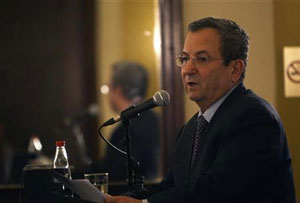Reply To:
Name - Reply Comment
Last Updated : 2024-04-23 11:51:00
 Israeli Defence Minister Ehud Barak called on Wednesday for major powers to speed up efforts to stop Iran's nuclear program, cautioning it would be tougher to confront it once Tehran managed to cross an atomic threshold.
Israeli Defence Minister Ehud Barak called on Wednesday for major powers to speed up efforts to stop Iran's nuclear program, cautioning it would be tougher to confront it once Tehran managed to cross an atomic threshold.
Add comment
Comments will be edited (grammar, spelling and slang) and authorized at the discretion of Daily Mirror online. The website also has the right not to publish selected comments.
Reply To:
Name - Reply Comment
On March 26, a couple arriving from Thailand was arrested with 88 live animal
According to villagers from Naula-Moragolla out of 105 families 80 can afford
Is the situation in Sri Lanka so grim that locals harbour hope that they coul
A recent post on social media revealed that three purple-faced langurs near t

21 Apr 2024